Both of our wedding days were the most sacred, splendid days I’ve known in this life.
The first—on November 10th—was just Andy and me. The second (our public wedding for family and friends) was a two day picnic the first weekend of June. The months between November and June were sweet as we were quietly married and establishing our home together.
The first meal I made us in our home was meant to be a frugal delight. I found some frozen freezer burnt meat and prepared a delicious stew with bread. We sat down at the table his mother had made years ago, prayed, and then I watched attentively as my new husband took the first bite.
“This is so good!” he said. “How did you make it?”
“I found some meat and I —”
“Where did you find the meat?”
“It was freezer burnt, but it’s okay. You shouldn’t be able to tell.”
“Keturah, that meat was spoiled. It got slimy months ago and I forgot to throw it out so I stuck it in the freezer.”
I burst into uncontrollable sobs. Our first meal was ruined! Andy threw out the soup. He tried laughing it , and suggested, “It’s no big deal, let’s just go get burgers.”
I wept the entire way there feeling like this was an omen, that I would be a bad house-wife. Once we ate though, we started laughing, and then lamented — we could tell no-one, for our marriage would be a secret until we had the wedding.
The winter passed with a quiet joy for us.
That stew was not a bad omen. The rest of our meals were nourishing and not toxic. With shrewdness, I was able to get out groceries to less than $50 a month. I poured myself into taking care of our tiny home. That winter he wrote his first book and I finished sewed my wedding dress. I forgot about the dramas that had coerced us into marrying before our wedding date. I forgot about the sacrifices, too — the ones I willingly and unwillingly made. That winter was bliss, and every trade proved itself worthy because my husband was — and is — so good.
Now that our wedding is done, I am able to freely write on what has pressed against my heart these last few months and of the pain and grace I received as I left my roots to cleave to my chosen soulmate.
I know my experience isn’t unique to me.
In many ways I had it easier than some — I was not shunned, only hassled mercilessly for my choice to marry a Catholic. My parents and siblings were present at my wedding and supportive (many of my friends did not have this luxury when they married). A majority of my extended relatives refused to attend the wedding (or threatened to but only to disrupt it).
However, while there was fewer family than I’d have imagined, many friends showed up to fill the void.
On some level, we each experience some acute loss when bridging a threshold. The dreams just can’t always keep up, and sometimes you have to find a way to reconcile yourself to what you’re offered in exchange — sometimes that reconciliation is better anyway. Meanwhile, there might not be a lot of comfort for the poet’s heart in the sorely sourced written word. There is a gap — or a blotted page—where it would have once been understood in the ancient days when lore was richly grafted through songs and stories into the lifeblood of our ancestors. And so, I take up the refined golden rule to write that which I wish to read.
Friends used to tell me I was raised in a cult. I would secretly take offense. I loved my large, clannish family. However, after maturing a little, I embraced the idea that I might be raised in a cult, and would introduce myself as “the granddaughter of many cults”.
Or I would say “I was raised in a non-toxic generational cult”.
I hadn’t had any bad experiences except for the judgment from normies in jeans with goals to have jobs and degrees. ”Why don’t you want that too??” They’d ask me.
I don’t remember feeling so lonely as a small girl, but the weight of my upbringing and the oddity of my nature clouded my vision during my teenage years.
I knew many girls whom I wished for close friends, but not until I was in my twenties was I certain any of them thought of me as a friend, too. If boys crushed on me, I did not suspect it. The only true security of admiration or love I possessed growing up was knowing I was something of the favorite grandchild and niece and that older people liked and respected me. Anyone my age assumed I must be judging them (usually I wasn’t) because, as Lewis writes in his “Screwtape Letters” I was not the same as they were and those differences disrupted their ideas of “democracy” and”equality”.
A slow change simmered when I started traveling. As I spent time with friends on their turf I grew in confidence and learned more of what it meant to be a friend and of how to better respect others. I strove to communicate in a way that was more acceptable so I wouldn’t be perceived as being so judgmental, and my views chilled out allowing my dreams to find a way to flourish. I unearthed solid friends, but had little hope of ever being wooed.
Most of my twenties were spent traveling. I visited various aunts who would see me, grandparents, cousins, and new and old friends. I knew I was in a unique place of life where I was blessed with the resources to do as I would and little responsibility outside of that which I created for myself. I made it no secret that I hoped to cultivate deeper bonds with these family members, and hoped that they, too, would put in the extra effort to be there for me. Naturally, I wasn’t disappointed and my efforts were mostly rewarded.
However, things weren’t always as straightforward with family or old acquaintances. I didn’t always feel respect reciprocated. There were still misunderstandings born before I was, and I had no wherewithal for addressing them. I was well-loved though. I was the eldest daughter, the eldest grand-daughter and niece. Not only did a lot of people have expectations of me, they had different expectation of me. They all waited and watched, some of them hoping I’d carry on the family traditions, others encouraging me to abandon them completely.
I chose to do something in the middle by finding a man who was my perfect match in every possible way, unknown floodgates crashed open. I soon realized that putting on a wedding is a great way to find out who had a piece of their mind they wanted to shove down my throat.
I knew I wasn’t brainwashed, nor was I oppressed or sheltered. I would concede that my upbringing was peculiar, but that didn’t need to mean that it was awful. Some of my relatives had declared their upbringing as toxic for their mental well-being, and all it got them was some sort of drug addiction or fetish for BIG GOVERNMENT and atheism.
They’d thrown out the baby from the bathwater while keeping the dirty water to sip, claiming “I’m processing my trauma.”
I knew I could drink from that same dirty water and be as angry or bitter as the best of them who leave “family cults'' for the greener grass of this homogenized, secular world. Why should I? I could clearly see that my family had issues. Whose family didn’t? Sure, some of our beliefs were detrimental to the sanctification of saints. Nobody’s faith is perfect. No ideology, heritage, or tradition is going to be healthy all the time. I was my own person with my own opinions and the bad beliefs of my grandpa or my uncles and aunts didn’t have to affect my own salvation, I theorized.
This isn't some sort of acknowledgement that I had Stockholm’s Syndrome. I wasn’t abused or mistreated. If anything, what I’d experienced was unique and beautiful because somehow as one of the favorites I’d been gifted rose-colored glasses and it was easy to look past the faults of my grandparents because they loved me unconditionally (mostly).
If anything, I simply knew that my family would always be there for me, and that when the time came God would use my wedding to heal all these rifts that I’d prayed over since my childhood.
I overestimated my worth to them.
One aunt had already planned a vacation to New York. She wasn’t going to come to our wedding instead. Another aunt’s husband said they couldn’t go because they weren’t hobos like us and had real responsibilities (i.e. car payments for a car that gets no mileage to family functions if it takes away from “the job”). Another aunt took issue with my husband having a tattoo and his lack of virginity (repentance means nothing to her). She said they could afford to attend, but wouldn’t unless I did the proper thing (have the wedding venue where I was from). I told her how I wasn’t from Montana (we moved there when I was sixteen) so it didn’t actually make sense to have my wedding there, she told me, “It sounds like you have some healing to do.” My Grampa would not support a wedding he deemed unequally yoked, and sent me Bible verses about how I was marrying a stranger who did not know God. My mother’s parents claimed to appreciate the effort I’d put forward getting to know them in recent years (I never saw them as a child because they disowned my mother when she married my father) but they couldn’t bear to be around their adult children (my mother’s siblings) who had so disrespected them by leaving home before a blessing was granted. Various cousins sent me ridiculous messages on all social media platforms telling me how Andy wasn’t godly, or how I was choosing his family over mine, or how we were being a bad example to my younger, “innocent” cousins. I received a couple anonymous emails too telling me I should probably call the marriage off if I didn’t want to risk hellfire. Some stranger messaged me saying she’d once had a conversation and had something “discriminating” to tell me that might make me reconsider marrying Andy (she’d found out… that he was vaccinated albeit against his will as it was forced on him by the military under threat).
Naively, I believed that when I got married both sides of my family would come together and forget their prejudices. Rather, generational estrangement was prioritized over relationships, and I suddenly found I’d lost ninety percent of my family. They did not ask me where my heart or my motives lay. Instead I received regular, lengthy emails and messages demanding I listen to what the Holy Spirit had revealed to them. I tried the tactic of pleading, of gentle dialogue, of asking them to simply trust that I was listening to God’s direction.
These sorts are all right in their own eyes — from the atheists trying to recover from “spiritual trauma” to the religious zealot continuing to inflict shame and condemnation on anyone in sight. There is no room for persuasion. There is no conception for tolerance.
I was angry — and hurt — for a time. I wanted to quit my Grampa’s book. . . how dare he turn on me after I’ve only ever hyped him up for years? I wanted to block and unfriend all my aunts and cousins. . . they who should’ve been in the kitchen preparing the wedding feast were pointing inexperienced fingers. Some threw unnecessary names at me. Others sent blasphemous emails misusing the word of God to validate their opinions, determining that Andy was not my spiritual match.
All of this would've been ten-fold more difficult if Andy and I didn’t secretly married on November 10. We were already faced with having to do a lot of traveling together because of being from opposite ends of the country and wanting each other to meet as much of our family as possible, and it was getting awkward having to inform the people we stayed with that we needed separate lodging.
In early October, my grandma took Andy aside privately, then me, and told us to marry ourselves privately right away. She said, “Wait until you meet his grandma—you’ll know then if you truly want to marry him. Don’t tell anyone if you wish until after your wedding in June. But don’t have a long engagement—I will be continually worried about your purity if you wait.”
I promised her we would do the right thing, but that we wouldn’t tell her of it until after our public wedding. Andy called my father and told him of what we’d been advised. I heard my father say he trusted us to do as we felt best. I met his grandma and loved her immediately. We wrote vows to each other, I wore a thin muslin dress with a little lace, then Andy took me to his favorite spot on a river where he’d played as a boy and where the trees had become like family to him. We prayed, said our vows, and we became man and wife before God.
The concept of “institutionalized marriage” gets thrown around freely in libertarian and anarchist circles.
They see it as this sort of game, and they are right to do so. Why is it even the union between man, woman, and God is suddenly taxable — not a bond of love, but something to be made corporate, profitable, and property of the state via marriage licenses.
What anarchists fail to recognize, however, is that marriage was sacred before it was institutionalized.
Because I’m too much of a believer in the romantic I can’t be a true anarchist, even though I do recognize the illegitimacy of the state permitting marriage.
A family friend ran into me at a thrift store a couple weeks before our June wedding. She told me, “Remember, marriages that last are a chord between three: you, him, and God.”
I said, “I agree.”
Naturally, I knew we possibly didn’t agree in quite the same way (or maybe we unwittingly do). It is a common and trite thing for fundamental Christians to say that marriage is a union between three, while adding contingencies: “it is also necessary to have someone you respect officiating, and for witnesses to be gathered, and for it to be right in the eyes of the state to make it all official.”
I’ve never bought into licensing marriage. My grandparents didn’t do it, and neither did my parents. And neither did most of civilization. The state assumed some sort of responsibility for marriage (and with that the right to determine what is marriage) only a couple hundred years ago. In those days a marriage license meant you had to have the right blood type, and that interracial marriages were forbidden. Nevertheless, in the 20th century and before, pastors and priests understood that marriage was from God, not man, and would officiate “illegal” marriages in which they would risk getting lynched or shot by the KKK. While the state now allows for interracial marriages and no longer checks blood-types before granting approval, it still believes it has the right to define (or redefine) marriage as being between any two (or more) people who love each other. I believe unchristian governments are too fickle and have no authority over such sacred vows.
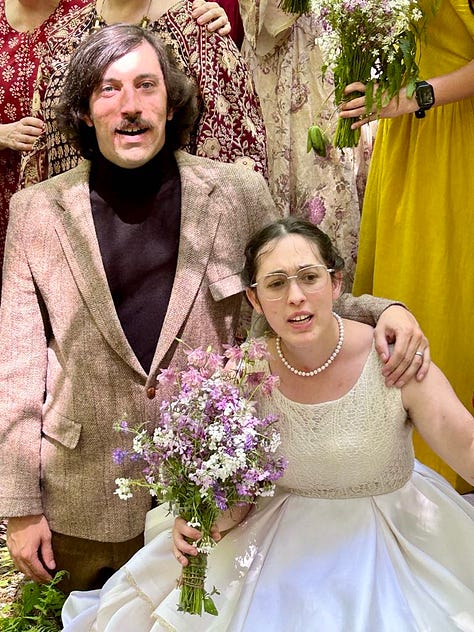

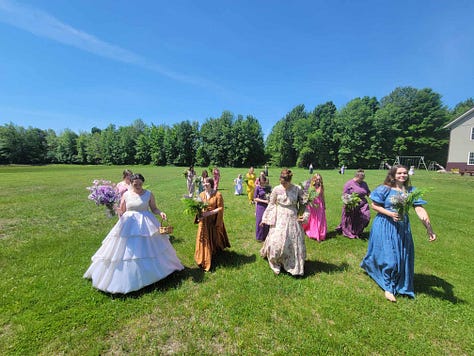
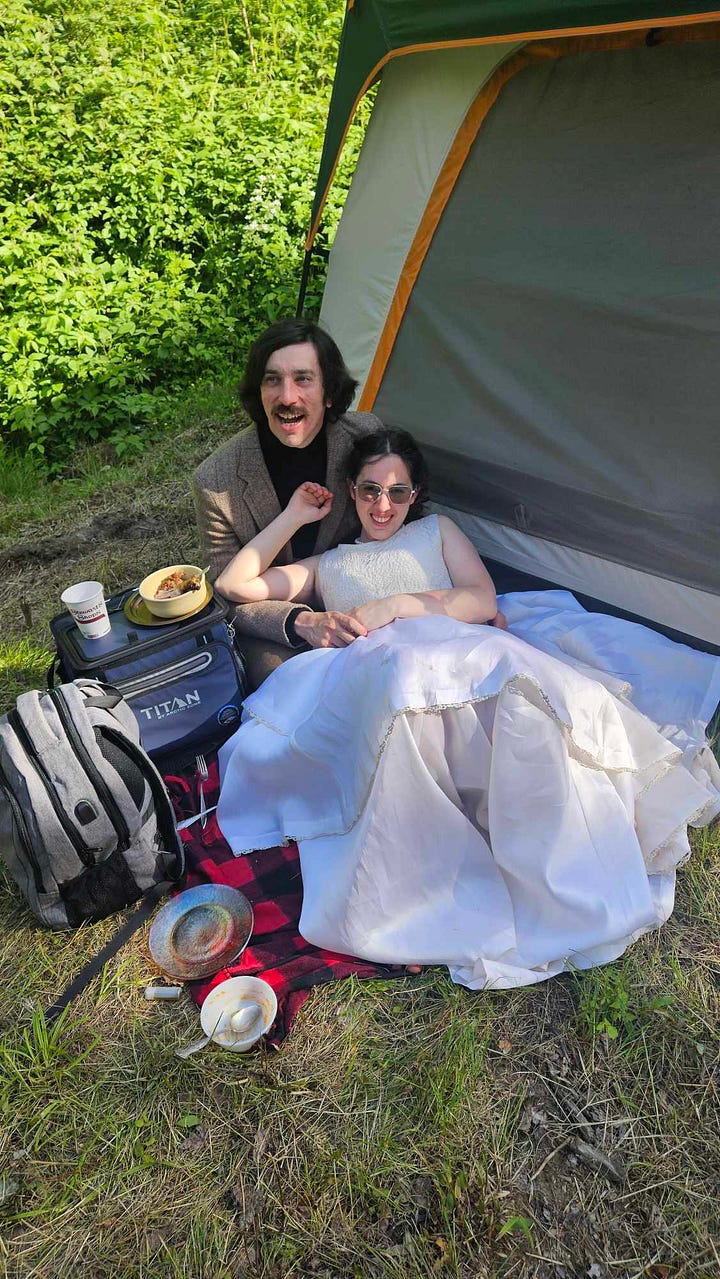

Marriage — the mysterious union between a man and a woman becoming a completed soul — is something that can’t be defined or limited by any establishment. It is not something for which one receives permission. Man and woman leave their parents and become their own unit. Before the 16th and 17th centuries it wasn’t something that was easily controlled.
Elopement, cohabitation, common law marriage, and invalid marriages were non issues and terms that didn’t exist. If a man and a woman were living together, they were married by the act of her entering his tent (some cultures had various rituals and parties to accompany this act of living together).
Paperwork was for the aristocracy (if they had it). Even for the majority of the early church, when records of marriage became more popular, eye witnesses weren’t required. A girl and a boy might simply declare themselves married, and months later if a pastor or priest would come through town, they would inform him of their vows, and it would be recorded in a Bible.
Why then do people care so much about doing a wedding in a proper way if the “proper” way is so recent and haphazard? Our culture is stripped of the simplicity of the sacred, is prone to prepare for divorce, and its legalities are based on prejudices, and is still built upon those principles. There is no moral reason to adhere to any of this—it could be argued, as I do, that it is ungodly to support a system that believes it has the right to speak for God on matters so unworldly.
The only Christian cope to hand the reins of marriage over to the State is Romans 13. And it is cope. It is good to respect those who rule over us. This is not validation for letting them take power from God for themselves, and Christians become responsible for the corruption of a nation that used to be “united under God '' until they let Romans 13 take that away from them.
Suffice it to say, I am not a fan of the government’s approval and want none of it. I don’t care if they try to redefine marriage, I only care to have that which is between God, my husband and me.
We moved into Andy’s house sometime in early December. My first prerogative was to make sure we had a small freezer filled with meat and some basic food staples. At the start the fridge was sparse — that is when I found the freezer burnt meat and tried to salvage it in the crock-pot.
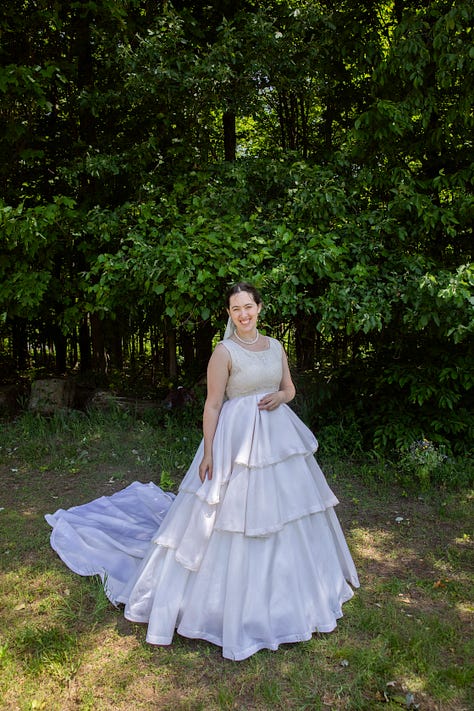
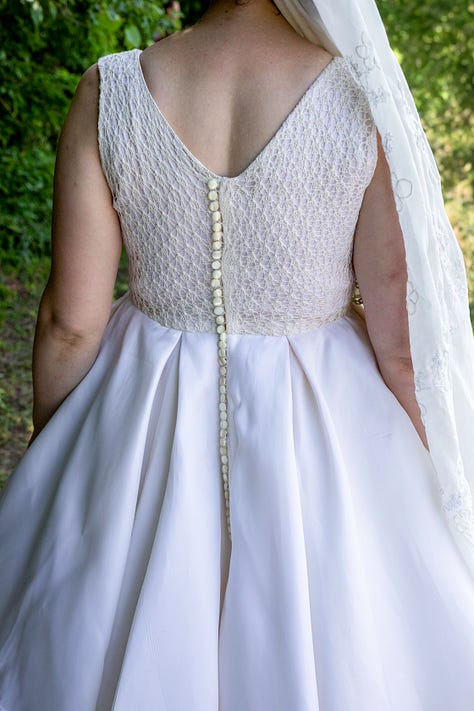
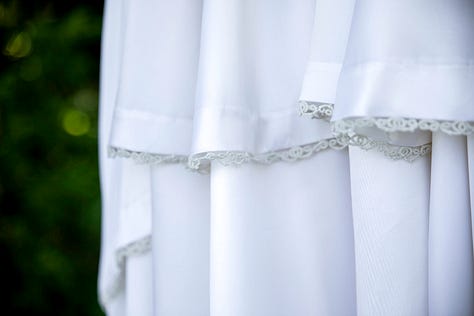



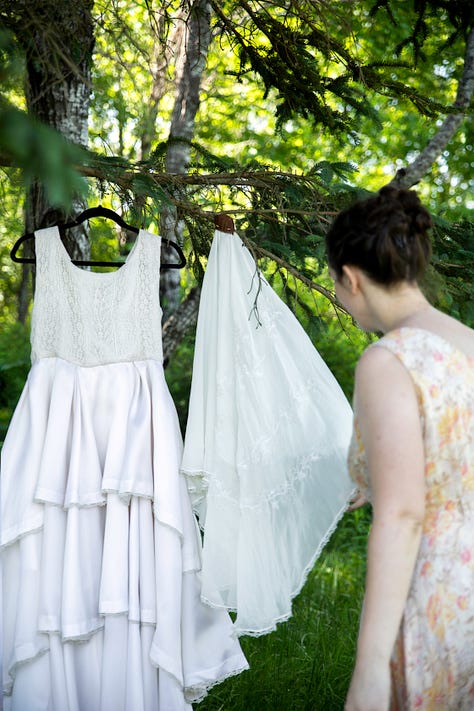
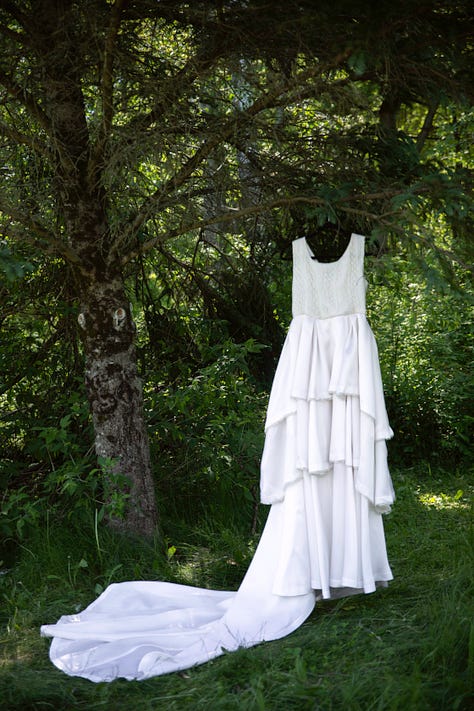
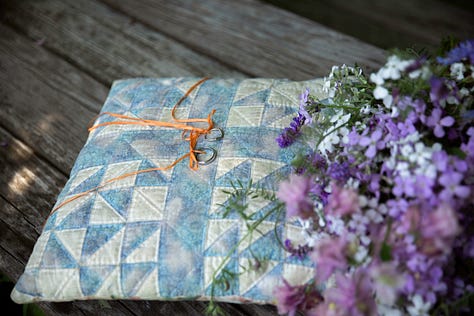
With our marriage sealed, and a long engagement no longer an impending threat, I began the work of planning our wedding while Andy worked on his book on homelessness. I would lock myself away to work on my wedding dress — he wasn’t allowed to see it! I would get a lot of horrid messages and emails, but the peace of our life that winter somehow balanced it all out. I can only imagine how much more difficult it would’ve been if we’d decided on a long engagement, and continue to travel together while trying to remain chaste instead of remaining put that winter. We built up a little routine and had the space and quiet to get to know each other in the every-day.
There was no escaping the judgment, but we’d done the best we knew with the advice and the circumstances we had. Being older, we didn’t need to beat around the bush much. We knew we wanted to be with each other. The weather initially seemed like a bother — I wanted a camp-out wedding with wild-flower bouquets. He wanted to travel on an indefinite honeymoon. We both wished to be free of societal opinions (let them all have their opinions after it wouldn’t matter anymore) and to have a good time with loved ones.
When we planned our wedding, I didn’t want to forbid anything which God has called good. There would be plenty of food and children.
If ever you feed a crowd of friends the miracle of the five loaves and two fish becomes more astounding. That Jesus did not send any of the five-thousand people away — that He clearly put no number or limit on this miracle — is worth mulling over. With faith, there is always plenty to eat, and so I didn’t bother keeping track of anyone who RSVPd.
I sincerely believe food contains metaphysical properties when shared with others, and that feasting is integral for community growth. The modern phenomena of anorexia is still not something that is fully understood, but I believe that it is the devil attacking the individual by making them unable to commune with fellow guests.


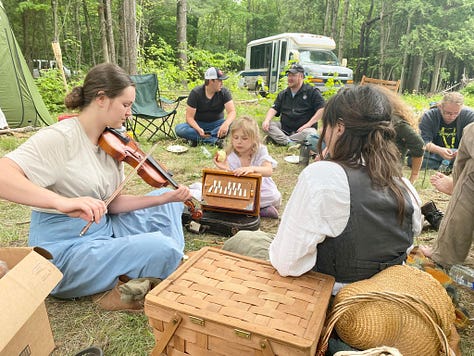
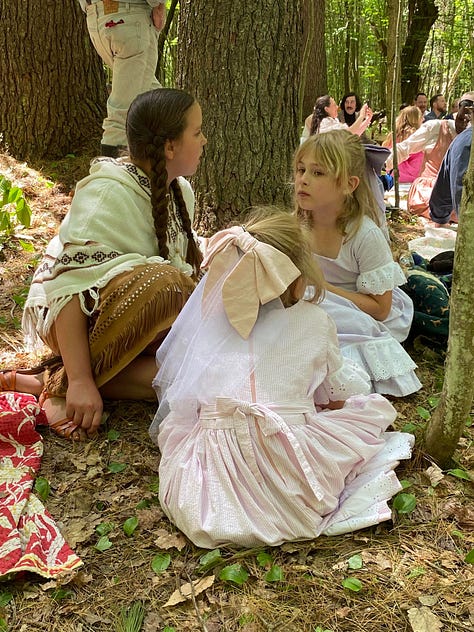
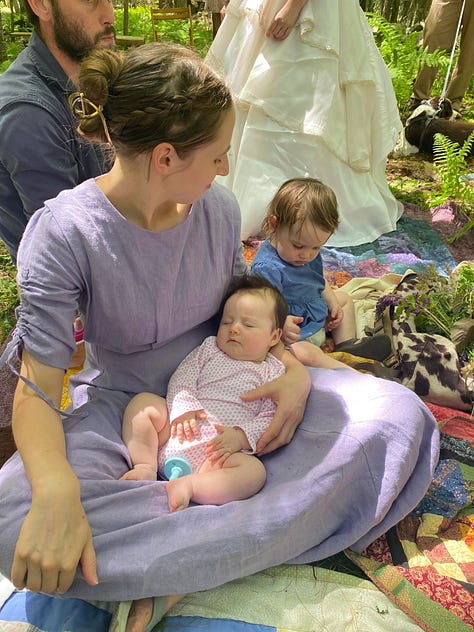
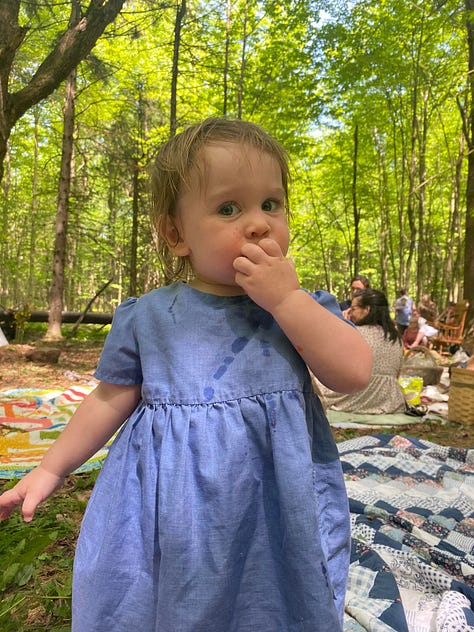

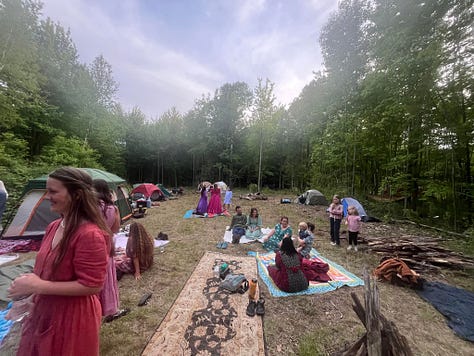
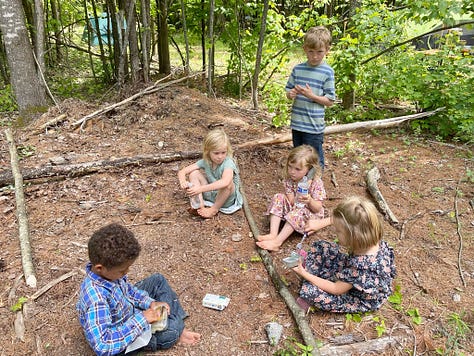
I know couples who refuse all dinner invitations because they eat only what they cook themselves. I know young people with no health issues who won’t eat what anyone serves because they are picky or are afraid to get fat. They do not understand the basic importance of most ancient cultures: you accept the food or drink put before you with no questions asked, and you do so no matter the consequences. This is faith. This is how we become unified with humanity.
Due to the decline of feasting with your friends, parties are re-framed just as the government has redefined marriage.
Jesus said, “Let the little children come to me” and stressed the importance of becoming like them. The societal bent is to forbid children in our company so that we might pay for expensive catering that charges per plate… and children would waste that delectable feast. In a society that doesn’t value children, it is unwise to pay for those who are only a nuisance and a burden. Few ever stop to question though if it is catering not children who are the issue.
Making something child friendly doesn't mean it has to be inferior. It doesn’t mean the food is less tasty, nor the party less lively.
I tried to put anything beautiful and wholesome at the forefront of our aesthetics.
I wanted strangers to be present (they were). I didn’t want anything fake… no polyester, no paper plates. Most of the bridesmaid dresses were sewn (all of them were linen) and we thrifted the glass dishes and silverware that I let the guests keep. My wedding dress was made from dead-stock silk. I wore no makeup and didn’t shave, only dabbed on a little cinnamon essential oil as perfume. I trimmed and buffed my nails, but did not paint them. The only jewelry I wore was a beautiful pearl necklace gifted to me by my mother-in-law.
I’ve always said I’d be a bride who wore only the silk dress I’d made, with no shoes nor makeup. Friends would ask, “But what if your husband wants you to shave or put some makeup on?”
To be safe I asked Andy what he wanted. He said, “I want to marry a woman, not some twelve-year old Afghan bride!”
After Andy and I became man and wife, we told a few people who we knew would not judge us nor spread it.
I didn’t want it to get back to any of my extended relations — they had enough opinions as it was. So we didn’t tell anyone that knew any of our family except my sister. We each told one or two friends, and then we told all our neighbors. I didn’t tell most of my friends because I trusted them to understand the situation and know that I have always been the type to do things in my own way and time, and share my feelings and thoughts when I’m ready. I’m simply not a teenager anymore, and neither are they. We don’t go around sharing our “deepest secrets” like we did as kids. We reconnect throughout the year (my preference is to drive and see them and catch up in person), hold mutual respect for our differences, and hopefully grow from the expansion of perspectives.
Fortunately I have a lot of great friends who see things mostly as I do when it comes to mutual respect. However, not all my friends felt as I assumed they would. Most did, and thought it cool. But with as many friends and bridesmaids as I had, I supposed it’s not unwarranted that I’d have two or three feel “deceived” or “betrayed”. I’ve since heard that one’s wedding is also a pruning of friendships, and that friends will somehow use it as an excuse to cut strings over past misunderstandings. I think this must be what it was — for two of my bridesmaids, childhood friends, did send me long emails after the wedding ending our friendship because Andy and I had been secretly married and they didn’t like that I had a “fake” wedding.
However, my other bridesmaids later informed me that those two girls had strange attitudes the entire time and that they belittled the flowers and dresses and wedding as “weird” and “not their thing”. Still I was grieved by the loss of friendships, especially as they were both friendships I had put a lot of effort into it.
Honestly, family drama isn’t an easy thing for anyone to navigate. We did the best we knew to do, and managed to do something that satisfied Andy and me with our desired lifestyle. In doing so, we postponed a lot of opinions for when they would no longer matter as much. I think some people are unhappy when you resolve something in a way that isn’t quite how they see fit and proper. Or perhaps some of these people never quite respected our differences in the way I did, and imploded due to assumptions and misunderstandings. So be it… friendships have their ups and downs, and if I’ve learned anything from our quiet winter, it’s that I can’t help how people will perceive anything I do, but I can be grateful God blessed me with a wonderful man on which to lean on and dance with through all these things.
Our situation was not an easy one. We both were marrying older, and were tired of relationship nonsense. When we met there were over thirty-six hours drive between us and a lot of people between those two marks who we wished to cater to. I wanted a springtime wedding with a dress I’d made and wildflower bouquets. He had to be in New York until April because of the military. If I’d stayed back in Montana, we’d have not had a healthy engagement and my relatives would have tried to drive a wedge between him and me. I stayed with his grandma for a time, but again, Andy would have had no appropriate separate lodgings for the winter. It was prudent to marry as soon as possible. And at twenty-seven I knew what I wanted. I didn’t want a long distance relationship nor a long engagement. I wanted to marry this man and I wanted a wedding when the flowers were blooming. We made it all work, trying to appease as many people as possible, and of course failing to do that, still managed to have a beautiful picnic.
Our private ceremony was for him and me. We agreed that the wedding would be for our guests, and not about us. We had our moment, and now we wanted to create a unique, special experience for everyone else. I think most people who attended were honored and loved what we did, with only some push-back from those who wanted something typical, throwing out that doing what we were doing wasn’t comfortable nor accommodating. I’ve been to plenty of weddings, so I know these complaints aren’t going to be unique — there will always be someone to try and hijack the plans and reform the aesthetics. However I knew what I wanted, who to delegate to so it would happen, and how to keep to the parts that mattered and let go of the whims I had no true power over.
The bridesmaids were the focus of the wedding decor.
I asked thirty-five women to be bridesmaids… any cousin that would be attending, sister-in-laws, sisters, and my dearest friends. Twenty-four of my bridesmaids showed up (most of the ones who didn’t come couldn’t due to pregnancies). With so many women you’d think there’d be a lot of drama. There really wasn’t any. I truly know some wonderful, empathetic women who are true cornerstones. I probably shouldn’t have asked all my cousins as bridesmaids mostly because they didn’t appreciate needing to wear a linen dress, but years ago I took a little bit of advice from an older woman too seriously when she told me, “It is more important to have family than friends in your wedding party as its the family you’ll still know years later, and friends drift apart”.
I now disagree somewhat with that advice. I think it’s of utmost good to incorporate family as much as possible in your wedding party, but it was my friends who helped calm me and who “got it” when I shared what I wanted, and it’s my friends who made things happen. Nevertheless, the cousins who showed up are gems, and so it all ended up being amazing.
All the bridesmaids wore linen dresses. About half of them made their own dresses, and my mother made quite a few of my cousins' and sisters’ dresses, too. I asked for their dresses to be floor length and a solid color other than the maid-of-honor’s dress, my sister, who wore a linen print. I told them to choose a style and complementary colors they’d wear again. Once together they truly appeared as a bouquet of wildflowers, singing a Capella as they walked down the aisle, and then as they stood together.
I asked guests to bring quilts to sit on with a picnic basket. I didn’t know how the ceremony itself would go as I asked the officiant, Eric Brende author of Better Off, to surprise Andy and me with something beautiful. He had Andy and I sit on the ground with our guests, and then my brother and Andy’s grandmother read portions of scripture. We sang hymns, and then Eric offered a homily. After that we had an open mic where people shared speeches with us, and then the camp-out reception commenced!


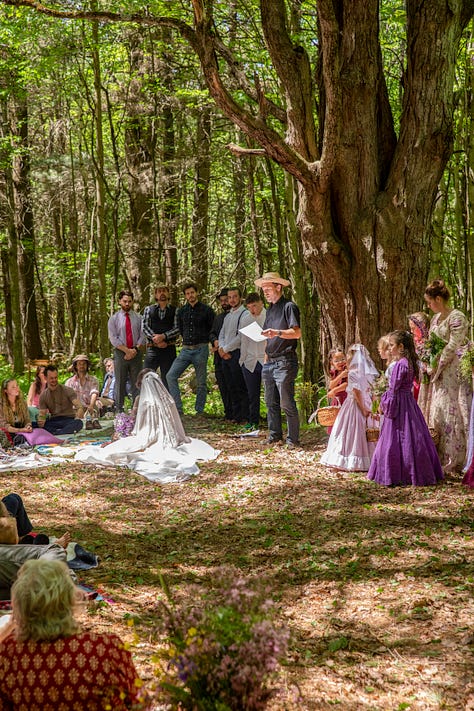
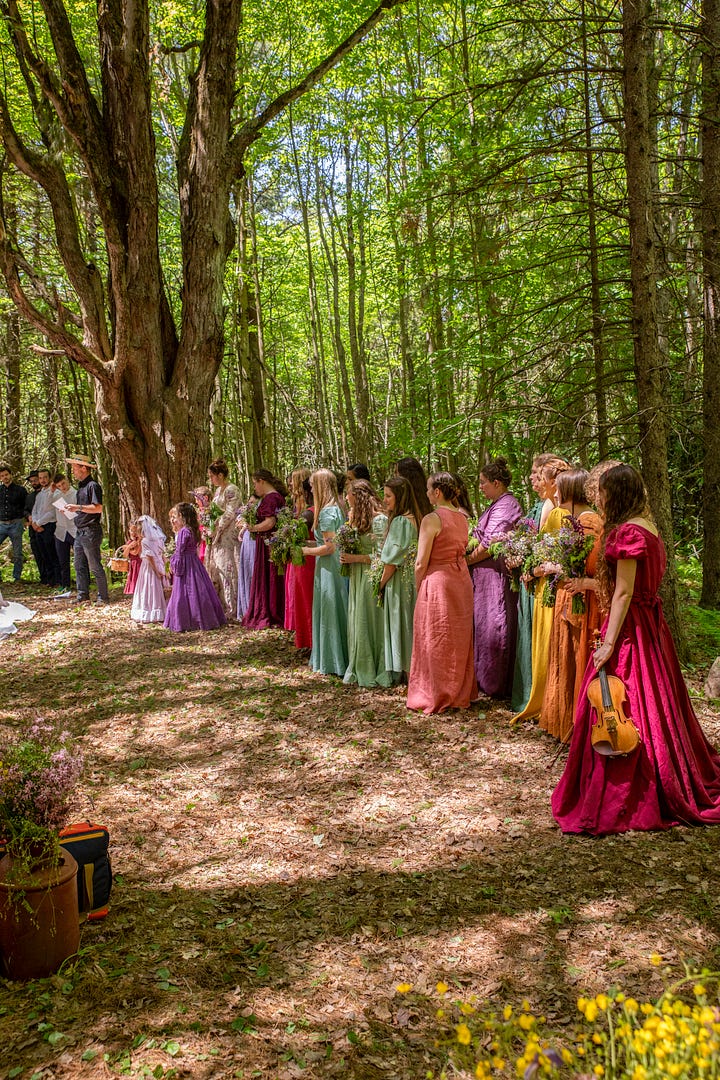
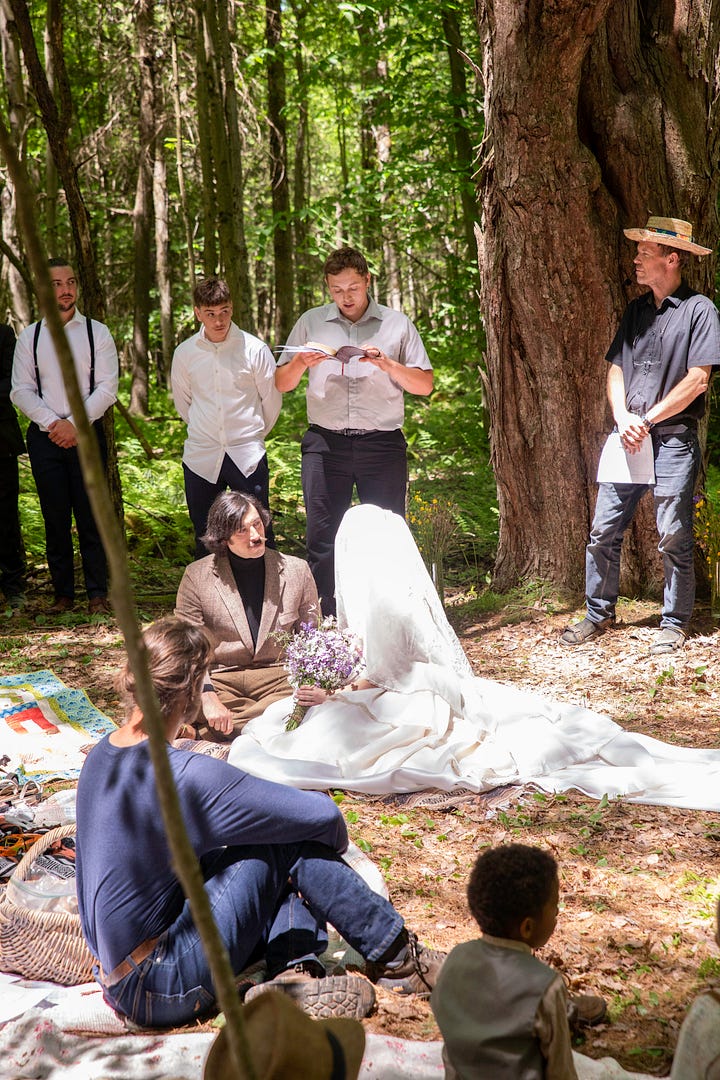
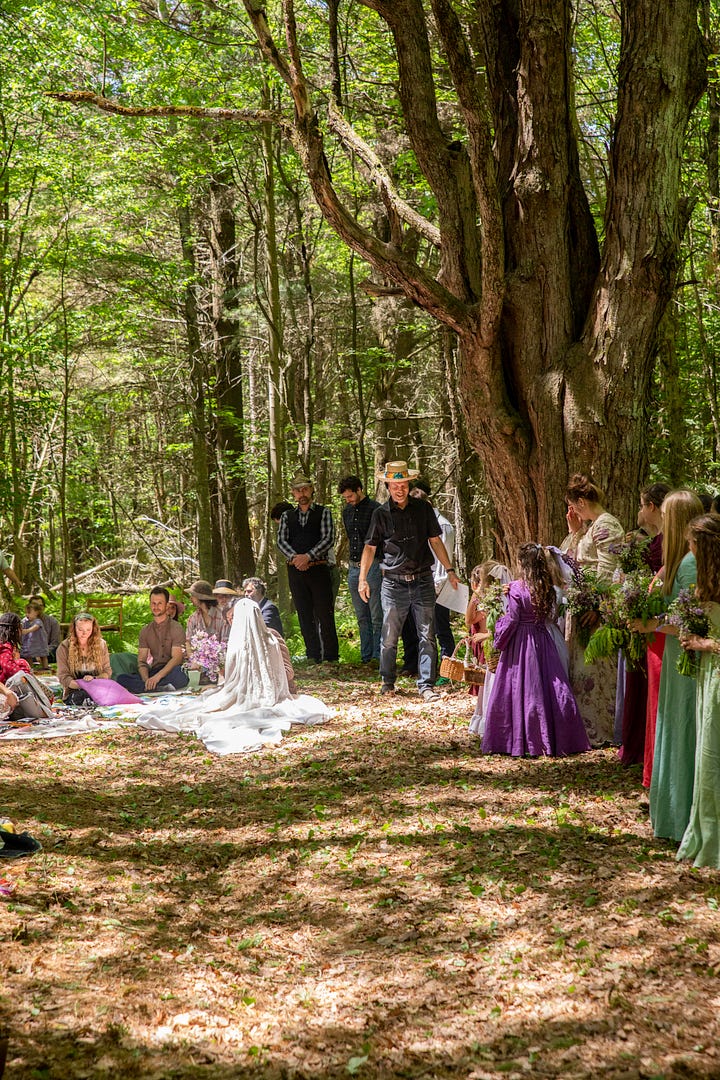
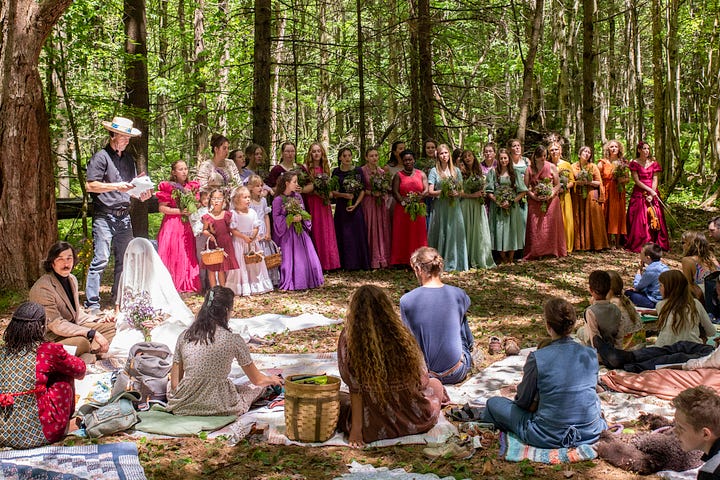
We provided a delicious, nourishing meal on Saturday and Sunday — curry lentils the first day and Andy’s grandmother’’s chickpea soup the next — along with goat meat, grilled chicken, and coconut cream pie.
It was already going out of custom when I was a girl, but I remember when it was traditional for the bride and groom to not see each other the day before the wedding, and how so very special it was when finally she walked down the aisle toward her groom and he saw her for the first time.
I told Andy I really wanted this when we discussed marrying ourselves before the wedding. He agreed we should do it either way.
We’d just spent some time with my family at a Sukkot gathering and decided we wanted to incorporate a little betrothal culture into it, and would separate two weeks (as opposed to two or three months). Because of logistics, we ended up doing an entire month, which was much too long to be apart since we were already married and used to spending every moment with each other. Neither of us wanted to be on our phones a lot, and we decided the stress of the wedding plans were mostly mine — what man needs to be so involved in all those details? We were originally going to have zero contact for the two weeks preceding the wedding, however we ended up quitting communication for only thirty hours before the ceremony. I’m so glad we did this — it really emphasized how integral the other person had become, how glad I was to be choosing Andy over all my relatives, how I simply had no headache when with him, no constant drama and worry over frivolous beliefs and judgement.

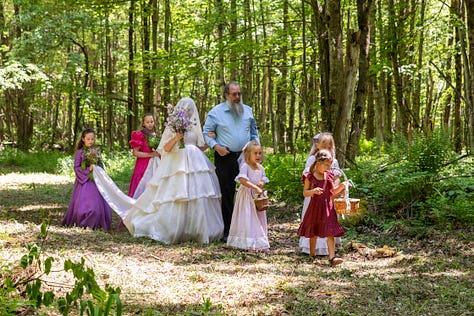

Even in this, we received side eye comments. “Why would you not see each other before the wedding? If you’re virgins it shouldn’t matter.”
The puritanical mindset prevails in the American mentality and it perverts that which is sacred by making it all about sex. Growing up I would be told, “A woman is a piece of candy to your husband.”
I told Andy this, early in our relationship, and he rolled his eyes, “Well, maybe… but you’re also a bowl of nourishing soup.”
Conservative Christian wedding ceremonies will drone on about how one or both were a virgin, how they “saved themselves” for each other, and how God will bless them because they have prioritized doing things the right way. Although I was thoroughly a virgin when Andy and I married (I hadn’t even kissed any other man other than him), I found this sort of talk vulgar and dehumanizing, bringing no glory to God. It is nobody’s business but God’s and your spouse’s if you’ve had sex before, or how much. There’s something equally repulsive in how fundamental Christians emphasize not having sex while also not educating their young on what a healthy sexual life looks like. The only things I was ever instructed on was how painful it might be and how it was my duty to please.
Maybe this doesn’t seem so bad at a first glance. Purity is desirable. But there’s a contingency: it becomes obscene if it gloats or puffs itself up. True purity has nothing to do with public proclamations of sexual inactivity, but is a mysterious, tangible aurora that is obvious solely by the absence of anything impure. There’s no reason to drone on about being a virgin if you’re exemplifying something thoroughly wholesome. It doesn’t matter if the rest of society is deteriorating, our job is to be a good example in how we present ourselves in a way that is honest and pleasing. Boasting about being pure utterly defeats the essence of purity.
What it leads to is painful wedding nights, because neither know what’s happening, and then traumatic misgivings about something that is supposed to be beautiful, a lack of pleasure, and oddly an inability to delay gratification (waiting to hold hands and kiss in ignorance etc. is like forbidding yourself to eat without fasting and only leads to binging)..
If anything, I do believe we should talk about delayed gratification, more, and even fasting (and feasting). But not in the metrics of, “Were you a virgin?” when you married, even though I was a virgin who had never kissed a man.
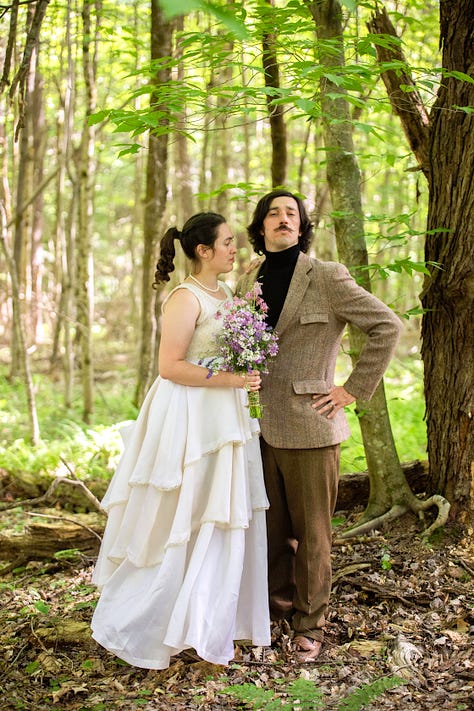
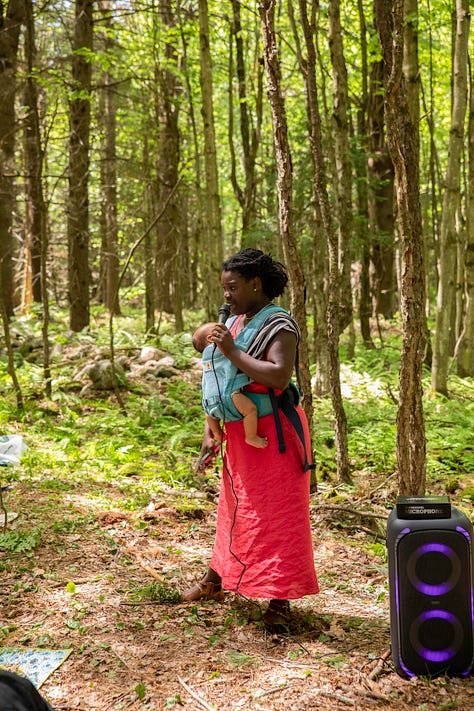


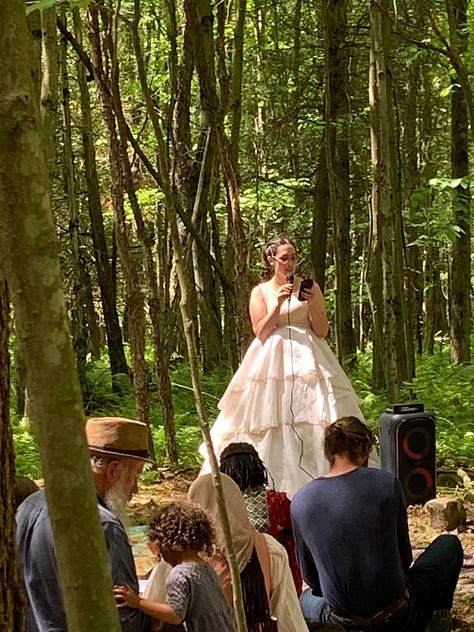
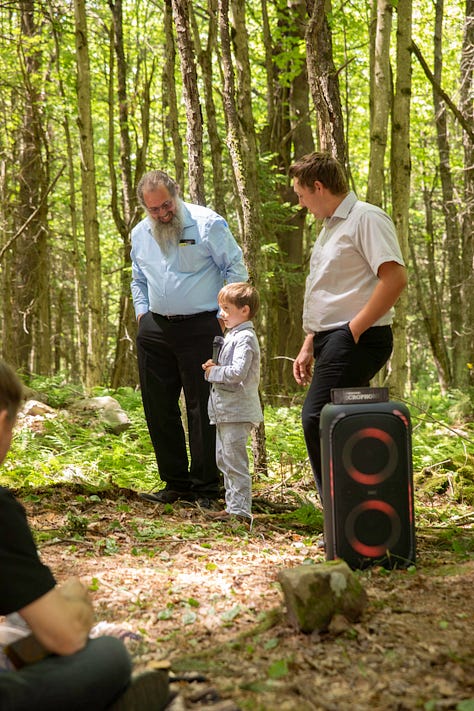
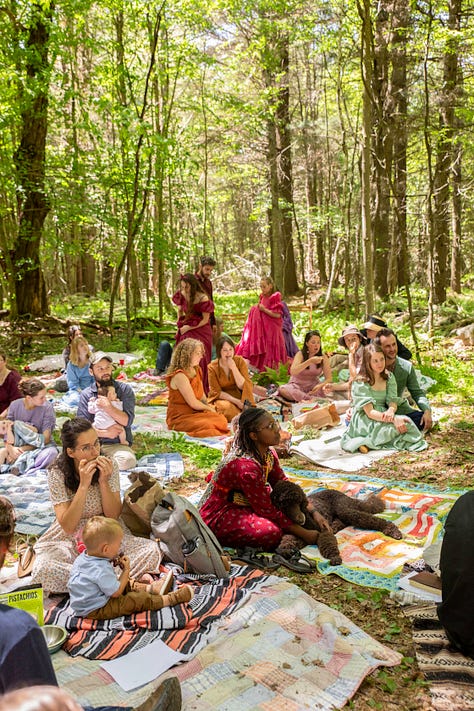
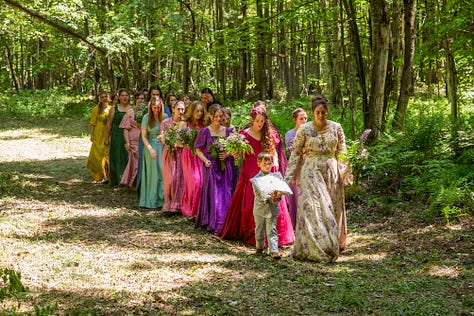
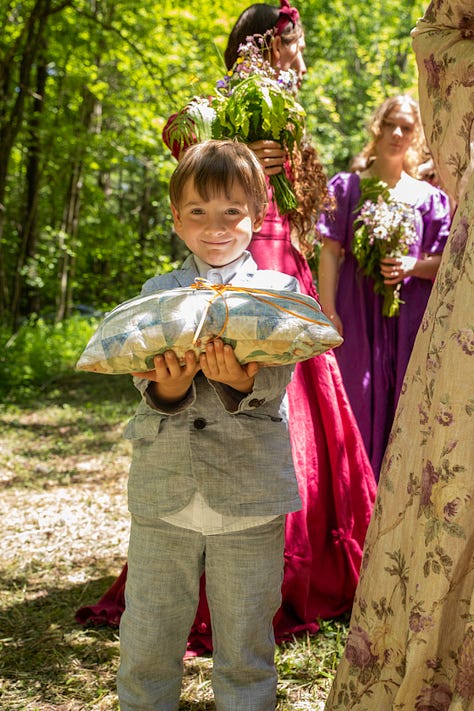
And so the wedding day was not about having sex for us — it was a day to be married and to rejoice in our union as man and woman with our guests. We chose to have the ceremony last a couple days so we might spend quality time with our guests and not dwell only on the thought of having sex — with those who traveled so far to be with us. Because we were already privately married we didn’t have just one thing on our minds. Our love had already grown into something deeper and more meaningful than lust.
There are those who are appalled if you hold hands or kiss before your wedding day. There are others who believe that sleeping together equates to fornication (the act of being a whore is not the same as the bond between man and woman, and to compare them is one of the most hideous things of fundamental Christianity). There were a few who felt “betrayed” to discover that we were already married, and that somehow that private ceremony made the public wedding “fake”. This is simply not so.
It was nobody's business when Andy and I exchanged our vows. I was so stressed and heckled on the public wedding day that sharing those vows really felt like I was doing it for everyone else, not for Andy or God. I was most moved emotionally by our vows when it was just the three of us, when it was me truly giving myself to Andy without thought of how others might be judging or dissecting what I’d be saying. Both days were equally real and valid — the one to bind us together, the other to receive the blessings of our loved ones. What was it to them what we’d already done? Our chastity was ours and Gods, and remained so. Our decisions were ours, personal and necessary to our situation.

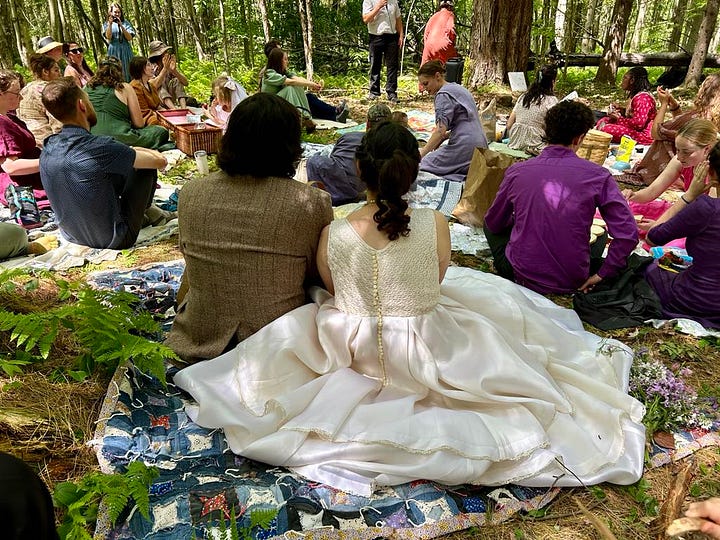
The consummation of our marriage had nothing to do with the celebration of it.
Both were real, distinguishable, even if in not quite the same order as the modern world has come to think necessary.
And I'm glad for this. The month preceding the wedding was quite stressful with daily messages and emails imploring me to leave the man who was already my husband. If I hadn’t already been certain of our commitment, I’m not sure how I’d have handled the onslaught of naysayers. I would’ve doubted myself more, and my love for Andy. However, because I was certain before I walked down the aisle, on the wedding day I was able to fully enjoy Andy and my guests and the food and the children and my friends without worrying about how it might feel later that night when Andy had me alone. I had no fears, only relief and anticipation and knowledge that all was now completed.
When I went home in May to pack up my belongings, my little brother caught me mimicking the sounds of sirens and our bus backing up, and started laughing. A little while later, we picked up my friend and her girls (my flower girls) and they heard me whistling some melody. “How are you doing that?" they asked.
“Well, you see, I found myself a man and started kissing him, and now I can whistle.”
I used to not be able to whistle — I just assumed it was impossible for me to ever do so. This winter, though, every day as Andy and I would take walks and he would whistle, I’d try to follow along. After a bit I was echoing the sounds he mimicked and tunes he whistled. It’s funny the things you’ll do when you fade out of the rat race and find you haven’t had a migraine in a hot moment. I started whistling — singing more in general — and losing myself to long, mundane thoughts and observances.
The interim between our weddings was something of a breather. We got to know the neighbors. I found myself thinking less about chatting with my friends and more about the price of milk and eggs and helping the old ladies in their gardens. For the first time in my life I relished isolation — I had all I needed all around me: my husband, my wedding dress in progress, the neighbors and their churches and events. I wasn’t thinking about making friends anymore, but of being a part of the wheel of life, and I was content to plod along, joyful in what was with not a qualm about anything outside of our bubble. I’ve never been so happy.
I’ve often said I don’t believe in privacy. Oh, I have secrets like the best of us. But I don’t really care to blur faces out of photos, and I don’t care what other people have to say about me to other people, and I really don’t care if my ideas or projects are plagiarized (it’s all God’s anyways). I sometimes suspect that privacy is a sort of psyop of the government to contain individuals in secluded corners of the interweb. Only the fool shares what’s really on his mind.
People with taste keep their personal information private, regardless of the fact that in a sea of humanity are little dramas and the structures of our face mold together into something akin — what are our differences worth that is kept to ourselves? Instead of wholesome gossip mending the rift between neighbor and friend we have ourselves separating the two so that they are seldom the same, if ever—and then our gossip, when it does spring forth, is only ever bitter ramblings of those who have hurt us and betrayed us, or of the outcast, or to the outcast.
I met no young woman my age this winter, only kindly old ladies, and so I had no need of a garden of my own and every desire to help them in theirs, and of teenage girls who needed a break from their mothers to hear me say the good things in a different sort of way because I can still remember what it was like to be a young sixteen year old girl with conflicting passions.
Even as I thought “I have no need for privacy—who cares what the online world knows about me, we’re safer in knowledgeable numbers than as radical, private loners!” I found myself growing quiet, with less to share. And yet, one has less need for virtual connections when you’re plugged into a thriving neighborhood.
There’s a lot that has been cut from my life.
It feels like the baby jumped out of the bathwater of its own accord and I’m needing to figure out where to dump the leftover bathwater before I accidentally swallow it.
I love my upbringing. I’ll never forget the stories or the people who made them happen, but I quietly “removed” the relatives from my FB friend list who said they don’t need to travel because they can see the pictures on facebook later. Social media isn’t an alternative to being with family and friends, it’s a salve for when it’s truly impossible, but that’s it. It brings a lot of people together. It also sometimes churns the cesspool of our dramas and traumas until all that’s floating at the top is the polished, inaccurate sob-stories and no connection.
A week ago a man pulling out of a ball park saw Andy and I with our backpacks. It was getting late into the evening in St. Anthony, Newfoundland. He rolled the window down, “Do you all have a place to stay?”
Two hours later we sat on his couch, our tent pitched in his backyard, sharing our life stories. Not only was his hospitality and generosity profound, his past provoked one to remember to not drink anything bitter but to savor only the sweet waters. He’d done it all from robbing banks to teaching martial arts to underprivileged children. He said, “There’s a Japanese word—Shu-ha-ri. Shu—tradition; ha—breaking of tradition; ri—transcending.”
Those who binge the desires and conveniences of society, who idolize their mental health, and who break tradition down to the vulgar, fundamentalism of “purity” lose out on this beautiful final step of transcending.
It’s a sad myth that we believe we can keep the baby and discard the bathwater. The breaking of tradition is letting go of the child who saw dimly in those murky waters we’ve bottled away. We become perfect by dissecting our tradition and by retaining the gold we sift from the debris in the water we pour out.
If we can do this, maybe Andy and I can manage to create something that cults wish to but fail to achieve. All we have to do is hold onto the good and let the rest— the disappointment and the hurt — slip away into the earth where only God can filter and cleanse it into something else entirely.
This winter I left behind my girlish fantasies and naivete, and became a woman.
I hold no worries or fears for what’s to come, or of what’s been left behind. I’ve walked in that era where everything is beautiful and new — all I need to do is “trust and obey”.
At the end of the ceremony I took a hammer to my phone to signify this certainty.
My faith is watered.
Anything I need will be provided in a million other ways, and my children will not be subjected to memories of their mother hunched over some “contraption for cope”.
It is the springtime of our romance. Already I know the summer is showing us deeper levels of what it means to be one flesh, one mind. And then autumn will arrive with variegated surprises and conundrums, followed once more by winter and its tests.
But we’ve already had our first winter, our first quiet submission to romance.
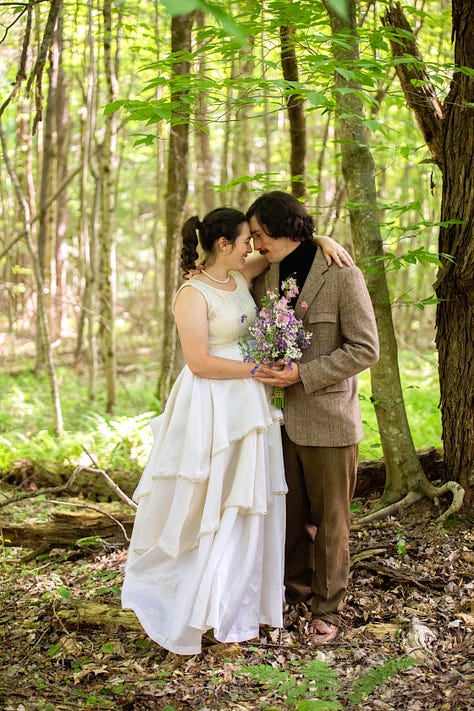
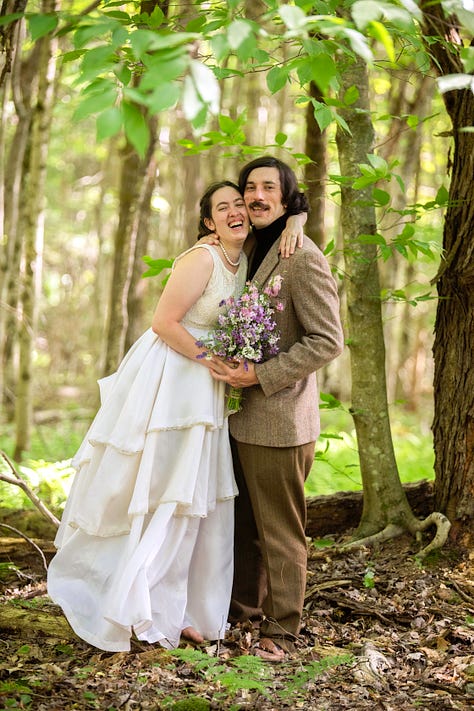

I’m already taken, but my husband says it’s O.K. if you want to buy me a coffee!





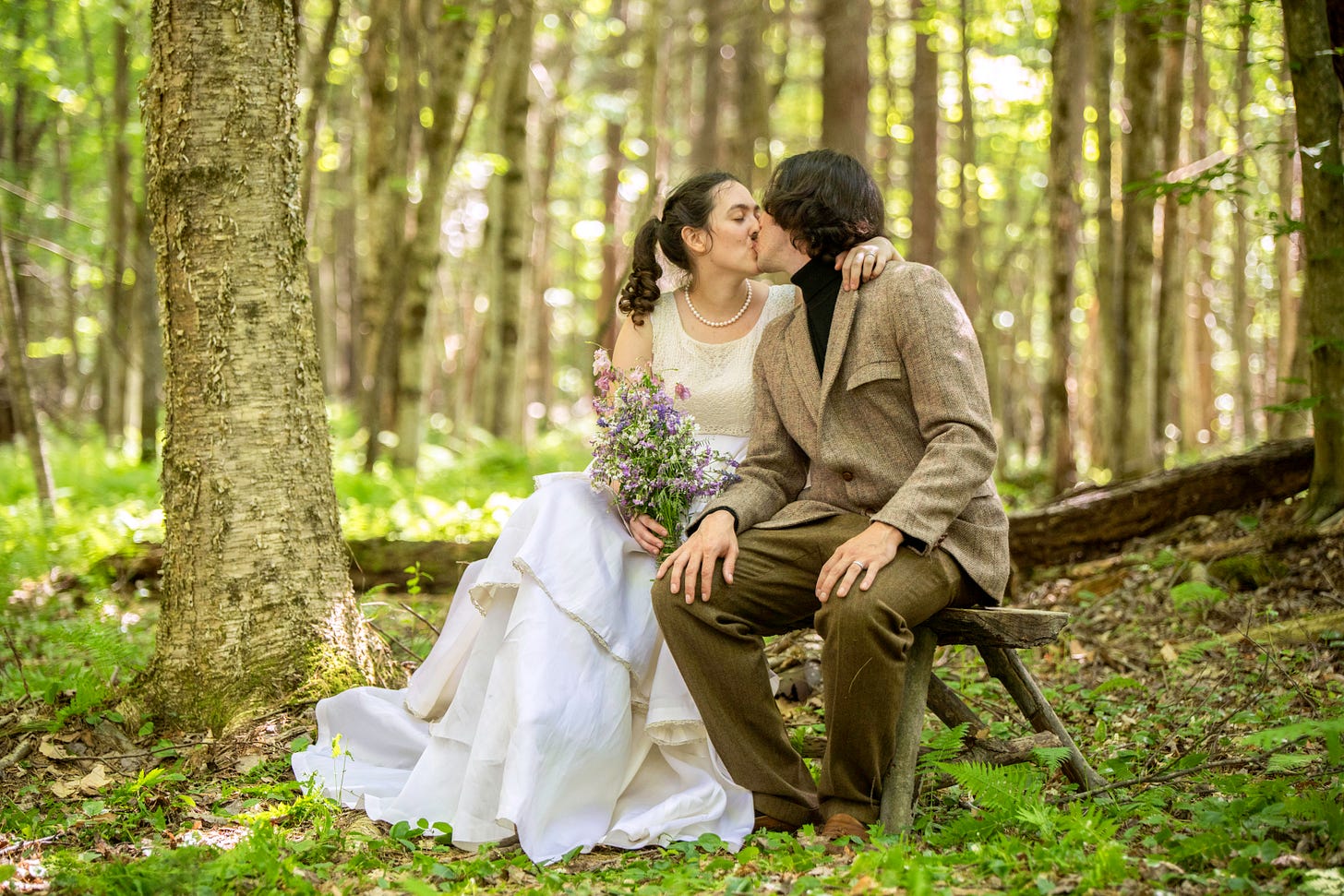

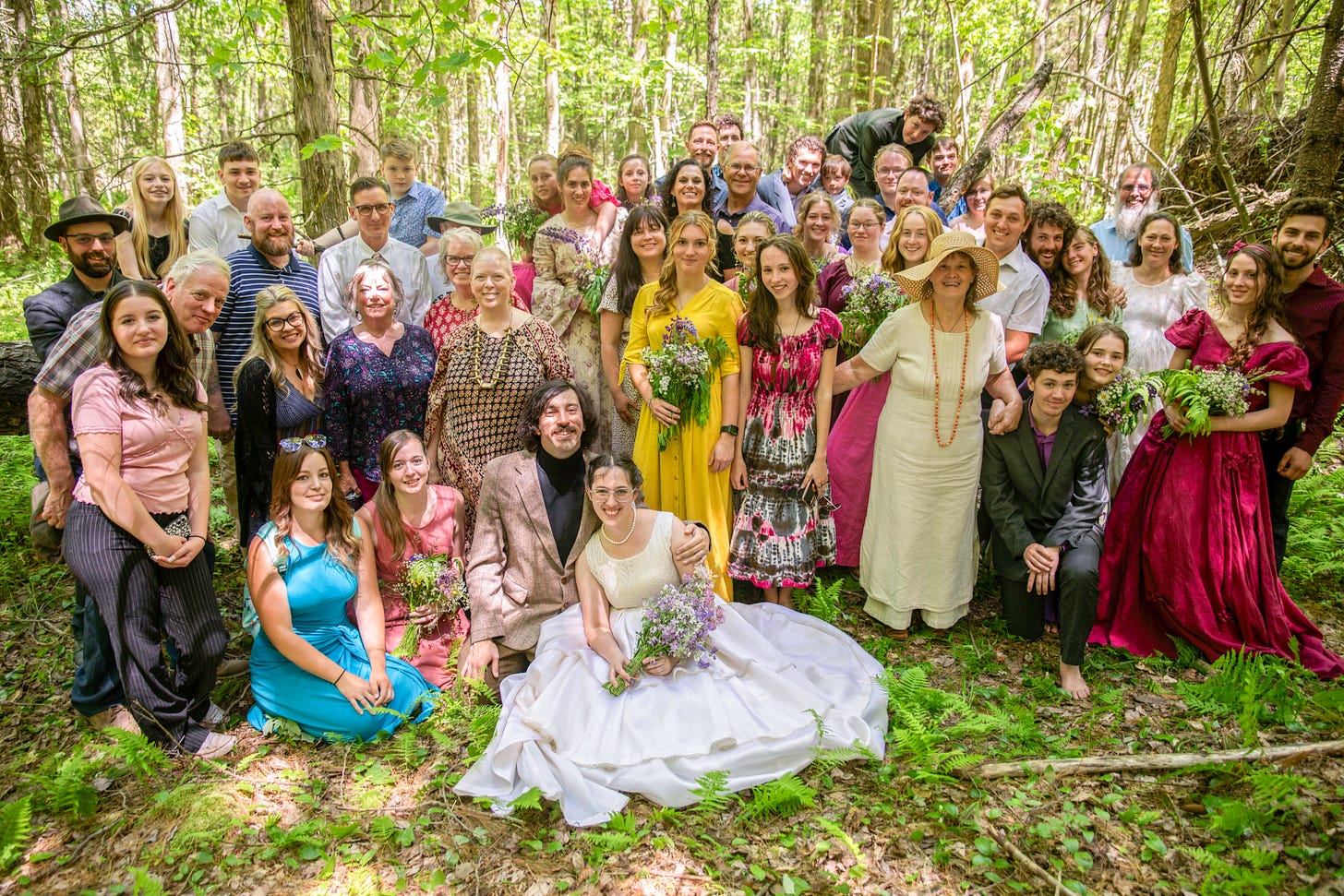

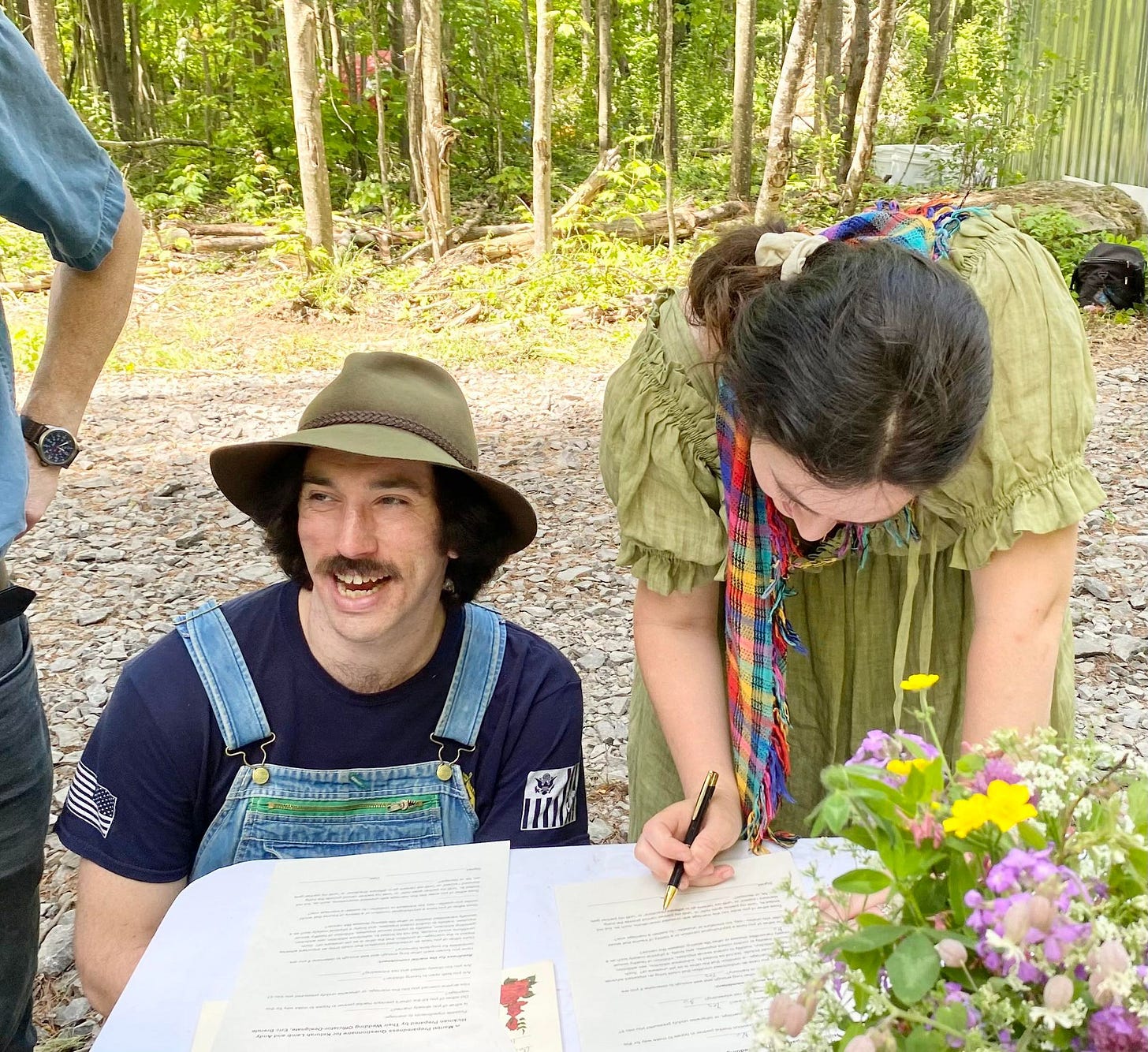
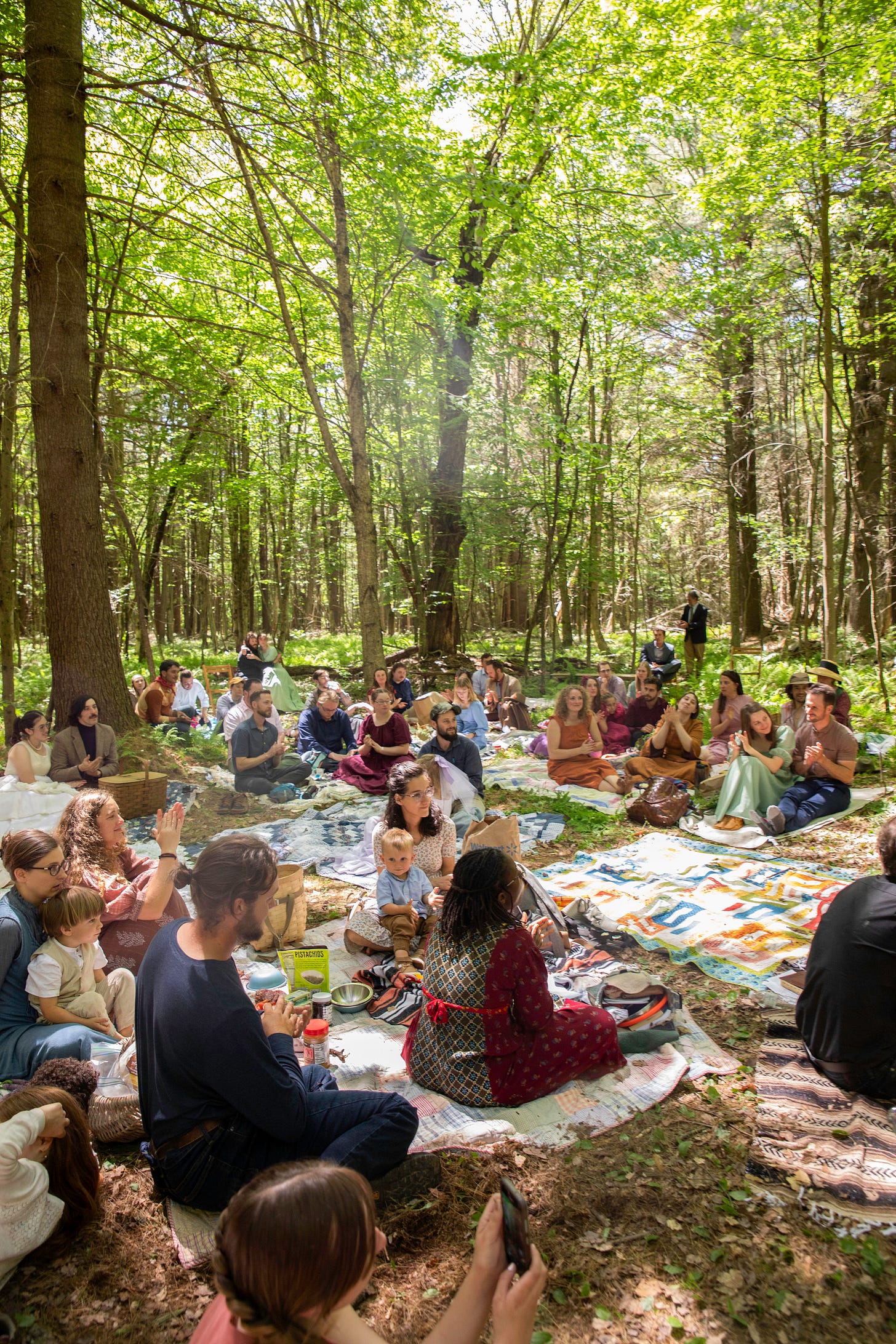
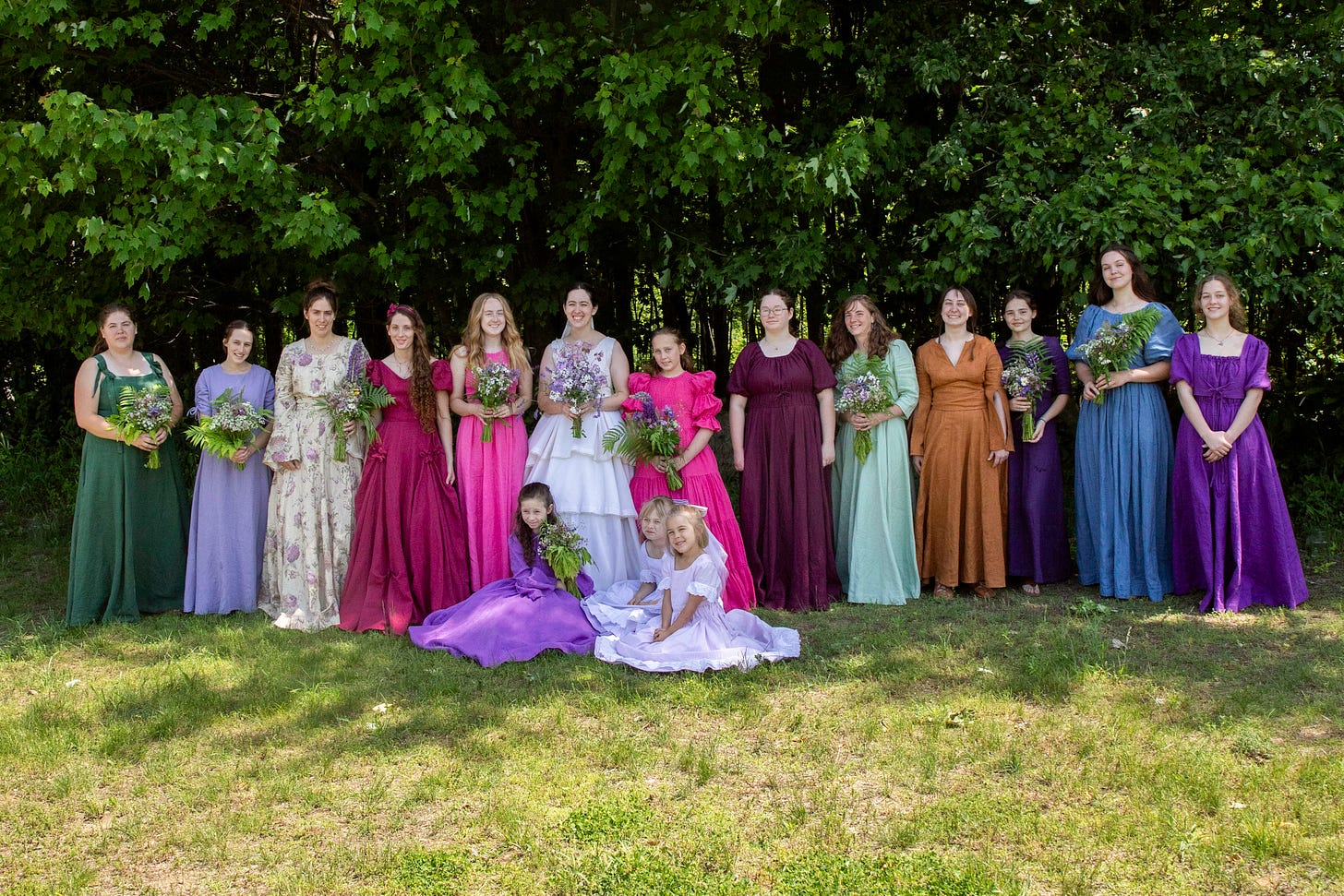


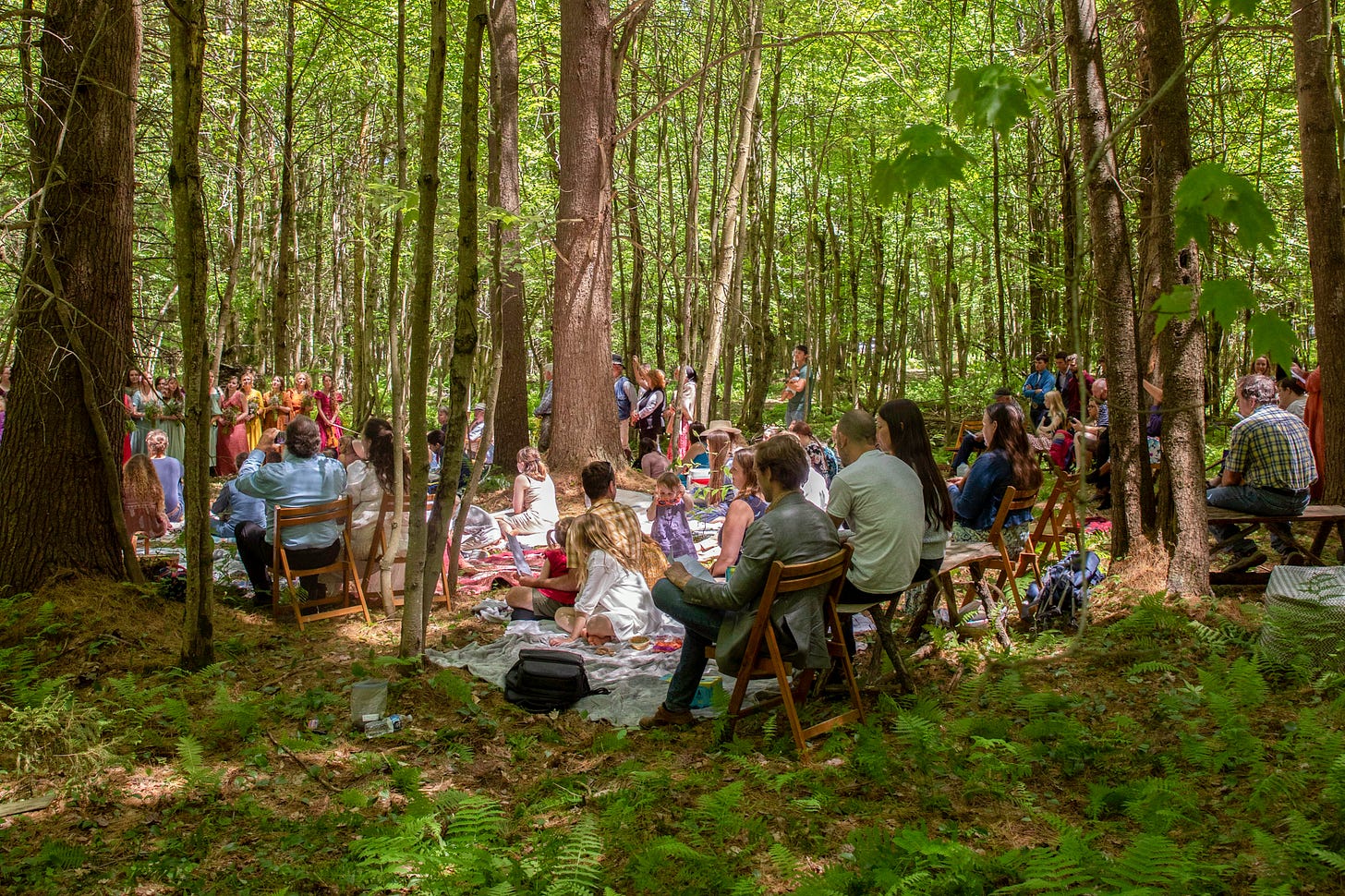

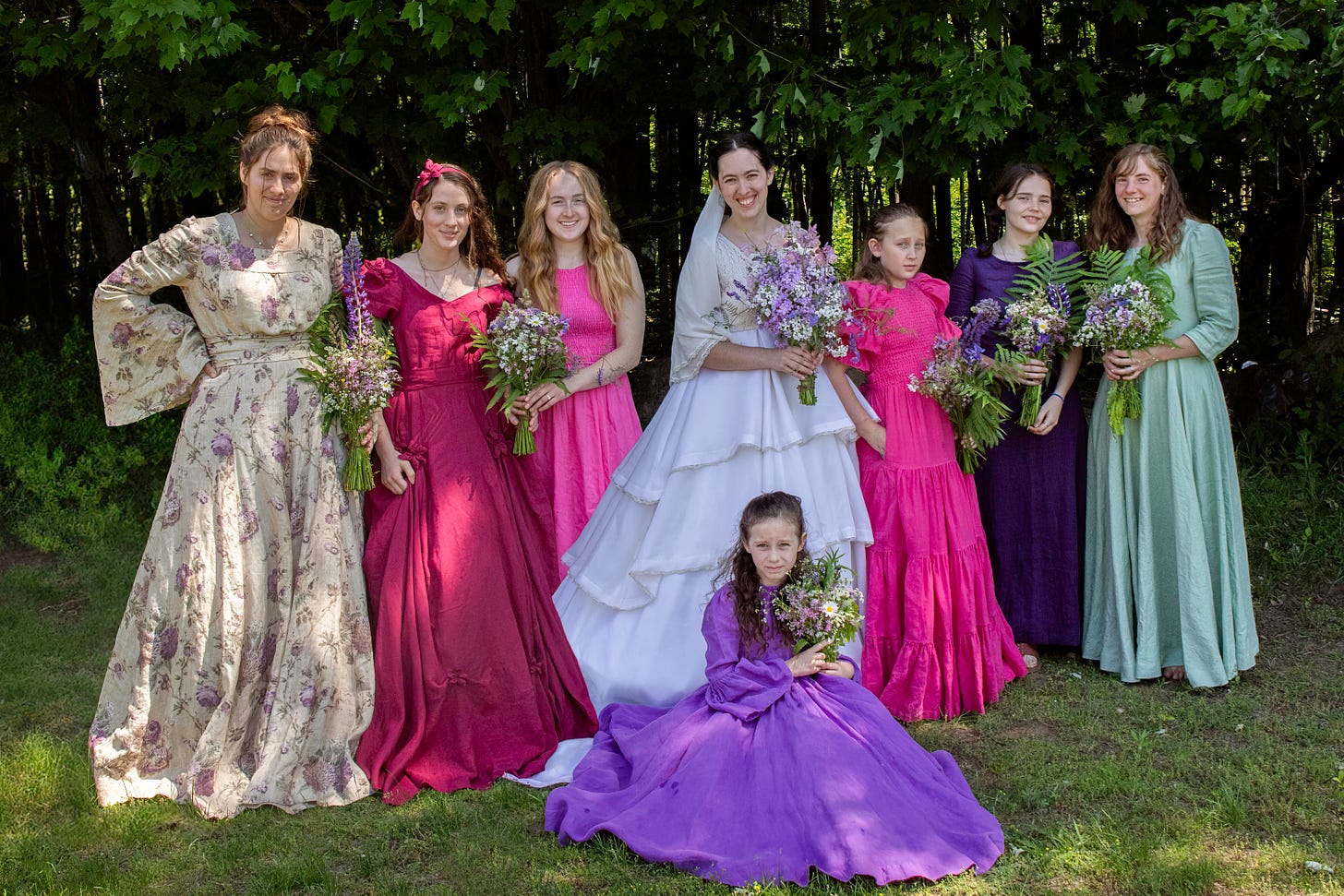




This was a lot of fun to read. I agree that marriage, especially in our culture at this time, makes a whole lot more sense as a vow before God than as something validated by the state.
I really wanted children at my wedding too. Children are what result from weddings-- seems sort of silly to exclude them.
I honestly lack the proper words to express the fullness of what an experience reading this was. But I am feeling an honestly immeasurable joy. And from the bottom of my often too cynical heart - I humbly and most sincerely thank you both for sharing your journey with us. Bless you both all the days.